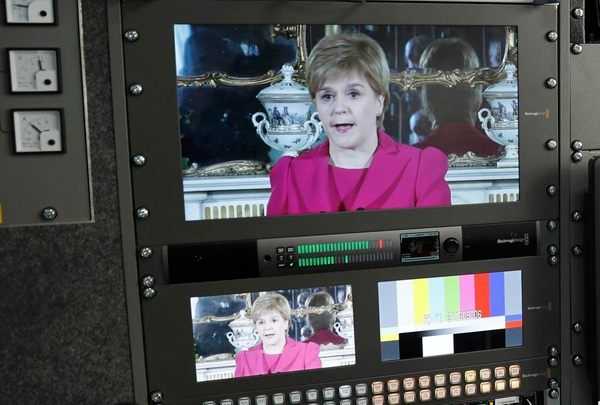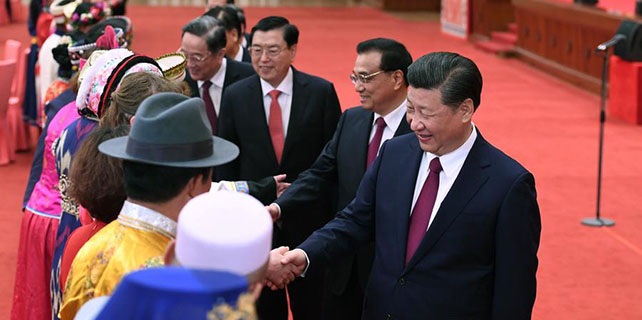Scottish government unveils plans for second independence referendum
The Scottish government has announced plans to call for a second independence referendum when the terms of the United Kingdom’s exit from the European Union become clear.
|
 |
|
Scotland's First Minister Nicola Sturgeon is seen on screens in a television production truck as she demands a new independence referendum to be held in late 2018 or early 2019, once the terms of Britain's exit from the European Union have become clearer, outside Bute House, in Edinburgh, Scotland, Britain March 13, 2017. [Photo/Agencies] |
Nicola Sturgeon, Scotland’s first minister, said her government would put legislation on the vote before the Scottish Parliament next week. She estimated that the vote would take place between autumn 2018 and spring 2019, before the UK leaves the EU.
She said her government was elected on a manifesto that said there could be a second referendum if there was a material change in political circumstances. The UK’s vote to leave the EU provided that material change, Sturgeon said.
The Scottish government cannot call for a referendum on its own - that must be done by the UK government - but it’s unlikely that London would block a referendum if it is supported by the Scottish Parliament.
A spokesman for the UK government said a majority of Scots did not want a second independence referendum.
“Another referendum would be divisive and cause huge economic uncertainty at the worst possible time,” he said.
In 2014, Scots rejected independence by 10 percentage points - 55 percent to 45 percent and most believed that the subject would not be revisited for a generation.
Sturgeon’s Scottish Nationalist Party can only muster a majority in the Scottish Parliament with the support of the Green Party, which also supports independence.
The First Minister said she had worked very hard to reach a compromise with the British government on the UK’s departure from the EU but this had not been reciprocated. Sturgeon said she was willing to accept Scotland’s departure from the EU but not its departure from the European Single Market.
The UK Parliament is expected to vote on legislation on Monday that will allow Theresa May, the Prime Minister, to trigger Article 50, which would start the UK’s negotiations with Brussels on its departure from the EU. If the government wins the votes, May could start the process as early as Tuesday.
Sturgeon’s announcement has added a whole new layer of confusion to the Brexit process. It is far from clear how the UK will leave the EU and the circumstances of a potential Scottish departure from the UK are even murkier. Scotland’s main reason for leaving the UK would be to stay in the EU, but it is not clear if European countries would welcome Scotland’s secession from the UK because it might encourage similar demands in countries such as Spain and Belgium.
The effect of Brexit on the economies of Northern Ireland and the Republic of Ireland is also causing major concern, and political parties are considering whether a united Ireland might be the only way to deal with the UK’s departure from the EU.
Sturgeon said she hoped to win an independence referendum but her case will be damaged by economic changes since 2014. Her SNP based its estimate of Scotland’s economic potential on 8 billion pound ($9.8 billion) oil revenue receipts. The fall in the price of oil and other factors means Scotland’s oil receipts are close to zero.
The writer is a freelancer for China Daily UK.









